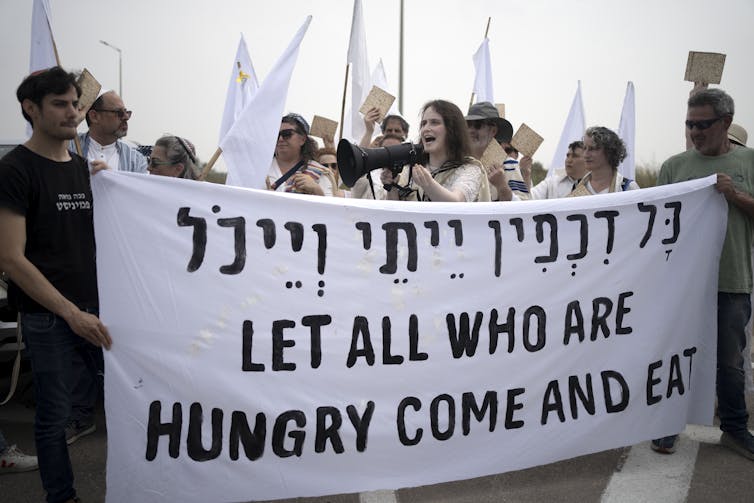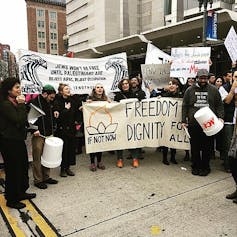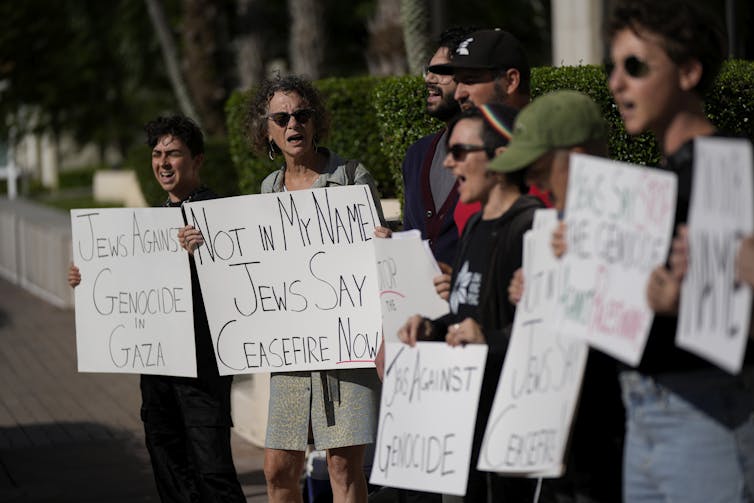Vox Populi
A curated webspace for Poetry, Politics, and Nature. Over 20,000 daily subscribers, 7,000 archived posts, 73 million hits and 5 million visitors.
Atalia Omer: For many American Jews protesting for Palestinians, activism is a journey rooted in their Jewish values
In April 2024, during Passover, a group of American rabbis approached a border crossing in Israel. Affiliated with Rabbis for Ceasefire, the group joined Jewish Israeli activists attempting to deliver food to Gazans.
It had been seven months since Hamas’ Oct. 7, 2023, attack and Israel’s subsequent assault on Gaza.
One of the American rabbis told reporters at Democracy Now! that this was the only way she could imagine marking Passover, a holiday that celebrates the story of liberation from oppression and slavery. Marching to the gates of Gaza with food for starving Palestinians was consistent with Passover’s imperative to invite the hungry to every table.
As of April 2, 62% of American Jews believe Israel has responded to Hamas’ attack in an “acceptable” way. Yet that support drops to 52% among U.S. Jews ages 18-34, with 42% saying Israel’s response has been “unacceptable,” according to Pew Research Center polling.
Many of those young people are involved in the variety of Jewish organizations that have mobilized for a cease-fire since October, such as IfNotNow and Jewish Voice for Peace. Public attention has focused on campus protests, which included many Jewish students – I am a member of Faculty for Justice in Palestine, which formed in response to concerns about freedom of speech for U.S. students mobilizing for Palestinian rights.
But as a peace and religion scholar, I know that some U.S. Jews’ involvement in Palestinian solidarity movements began years before the current war. In my ethnographic research, which included in-depth interviews and participant observation work, activists emphasized that they were inspired to act because of their Jewish identity and values, not in spite of them.

Journey toward activism
Many interviewees came to activism for Palestinian rights after wrestling with how to square their beliefs and ideals with the reality of Israeli policies they do not support – policies that they feel are often invoked in their name.
My 2019 book, “Days of Awe,” examines American Jewish critics of Israeli policy and Zionism – support for a Jewish state in the Middle East. Some activists focused on the Palestinian territories Israel has occupied since 1967, which they consider a departure from the country’s ideals as a Jewish democracy. Others found themselves in complete disagreement with the idea of Zionism, given how the creation of the new state necessitated Palestinian displacement.
Their activism has taken different shapes: from protests in the West Bank against the occupation, to forming anti-Zionist synagogues in the U.S., to rewriting Jewish liturgy to reflect solidarity with Palestinians and other oppressed people.
For example, one interviewee in his mid-20s shared an experience from a 2008 Birthright trip to Israel, a free tour designed to strengthen young Americans’ connection with the country. The trip coincided with Operation Cast Lead in Gaza, which lasted about three weeks and resulted in about a dozen Israeli deaths, approximately 1,400 Palestinian deaths and thousands of people displaced.
A tour guide was reluctant to respond to the young man’s questions about the conflict. This prompted the student, upon his return to campus in the U.S., to read about the Palestinian experiences of the Nakba – meaning “Catastrophe” in Arabic – of 1948, the year the state of Israel was established, when hundreds of thousands of Palestinians were forced off their lands or fled.
This interviewee and others say their journeys toward activism began because their understanding of Jewish values was inconsistent with what Israel was doing in the name of Jews’ safety. It was also a journey of “unlearning” or critique – challenging narratives that emphasize the concept of Jewish return to Israel or that downplay Palestinian displacement.
They were tapping into Jewish tradition in new ways – what I refer to as “critical caretaking.”

Take IfNotNow, an American Jewish group opposed to Israel’s occupation of the Palestinian territories. The movement was born during the 2014 Israel-Hamas War, when a group of young Jews organized a public recitation of the mourner’s kaddish, the Jewish prayer for the dead. By reciting both Jewish and Palestinian victims’ names, they hoped to use Jewish tradition to challenge the devaluation of Palestinian lives.
When I asked Rebekah – a pseudonym for a college student in the American South whom I interviewed for my book – how she understood her Jewishness, she told me: “I have always maintained that the basis for my activism was my Jewish ideals, the radical equality I had absorbed at home.”
Shadow of history
For Rebekah and many other American Jews, the cultural memory of the Holocaust, and the common refrain “Never Again,” inspires their activism for Palestinian rights.
“Growing up in Hebrew schools, you grow up with the nightmarish Holocaust films,” she stressed. “The conclusion of this education should have been clear: ‘You can’t do it to another group of people!’”
This lesson is reflected in the cry “Never again to anyone,” heard at demonstrations over the past few months.
Another interviewee likewise asserted that her solidarity with Palestinians is grounded in the legacy of the Holocaust: “For me, understanding the Holocaust was hard because of the enormity of it – it happened because masses of people made a conscious decision to do nothing. I didn’t want to do nothing.”
For these interviewees, discriminatory or violent policies contradict their understanding of Jewish values, which they assert by standing in solidarity with Palestinians.

Another interviewee told me: “I consider myself a spiritual Jew. I am able to separate Zionism from Judaism and I believe in equality. Because I am Jewish, I protest – I am informed by values of humanism, which is the main framework for organizing. The experience of doing solidarity work actually strengthened my Jewish identity. … My Judaism translates into my commitment to uphold universal humanist values.”
Here and now
In 2017, several dozen Americans gathered with other activists in the southern hills of Hebron, in the West Bank. They established what they called a “sumud” camp – a Palestinian concept denoting steadfastness – to protest the Israeli military’s decision to declare the area a “closed military zone,” meaning Palestinians must leave.
The activists wore shirts exclaiming “Occupation is Not My Judaism.” Occupation, they say, dehumanizes Palestinians and Jews alike – so they are seeking their own liberation, too. Therefore, their “critical caretaking” is not just about underscoring what Judaism is not. It is also about rewriting what they believe Judaism is.
For example, many of these organizations decenter Zionism’s role in Jewish texts and liturgies. Rather than emphasizing the idea that the “Jewish home” is in the historical region of Palestine and Israel, some emphasize “doykayt,” Yiddish for “hereness”: the concept that Jews’ true home is wherever they are in the world.
Doykayt is just one example of how these activists embrace often-overlooked aspects of Jewish history, including marginalized voices such as Arab Jews and Ethiopian Jews, as they discover new ways to live their Jewish values. Through their activism, they are trying to convey their understanding that Jews cannot be free until Palestinians are free.
First published in The Conversation. Included in Vox Populi with permission.
Atalia Omer is Professor of Religion, Conflict, and Peace Studies at the Kroc Institute for International Peace Studies and at the Keough School of Global Affairs at the University of Notre Dame. She earned her PhD in Religion, Ethics, and Politics (November 2008) from the Committee on the Study of Religion at Harvard University. Her most recent book is Days of Awe: Reimagining Jewishness in Solidarity with Palestinians (University of Chicago Press, 2019).

Thank you for this very thoughtful article. It gives me a modicum of hope that peace will finally be achieved someday.
LikeLike
Thanks, Mandy.
>
LikeLike
Yes, I believe that is why we Jews make such good supporters of social justice – it’s part of the philosophy of our religion. On October 8th, the day after the Hamas atrocities, I imagined the Muslim world chanting in the streets, “NOT IN OUR NAME,” and “TWO STATE NOW.” Instead, we were abandoned, and quite the opposite of not in our name, there were celebrations of rape, murder, torture, and kidnapping, and calls for our death – all of us, wherever we live, having nothing to do with the policies of the State of Israel. During the Second Intifada, I had 30 of Marla Bennetts friends from the Pardes Institute of Jewish Studies who flew into San Diego for her funeral, tucked into sleeping bags and beds all over my house. She was studying in the cafeteria at the Hebrew University when a terrorist backpack blew her precious body to smithereens. She and two others – gone in a flash – their families changed forever. Globalize intifada? Do these kids in the encampments on college campuses know that the first and second intifada were about blowing up civilian busses, people sitting at cafes? I appreciate this article about who many of us Jews are as a people who want to repair the world. I wish we had some support.
LikeLike
Thanks for this, Julie. Most of my Jewish friends are opposed to the war in Gaza. I admire their integrity.
>
LikeLike
I’m opposed to Hamas, and also the death of all innocent civilians in Gaza. Hamas must be dismantled – never to be able to attack. They must let all hostages go. It’s an impossible situation.
LikeLike
Yes, my friends in Israel feel the same, but helpless to do anything right now. They were active well before October 7, when Israeli settlers got the go-ahead to do whatever they wanted with Palestinian lands.
LikeLike
I have lost so many friends over this issue and still don’t understand how a friend who agrees with me on every other issue cannot see the horror in the killing and displacing other human beings on both sides.
LikeLike
This is such an important article! It taught me so much. Thanks, Mike.
LikeLiked by 1 person
Thank YOU, Laure-Anne.
>
LikeLike
Professor Omer rightfully emphasizes the moral imperative incumbent on the Israeli government that it has failed to observe and implement. The current government is using a policy based on a justification used by the Nazis in the Holocaust. Truly tragic irony. I applaud Professor Omer’s courage in voicing opposition to the horror.
LikeLiked by 1 person
Thanks, John.
>
LikeLike